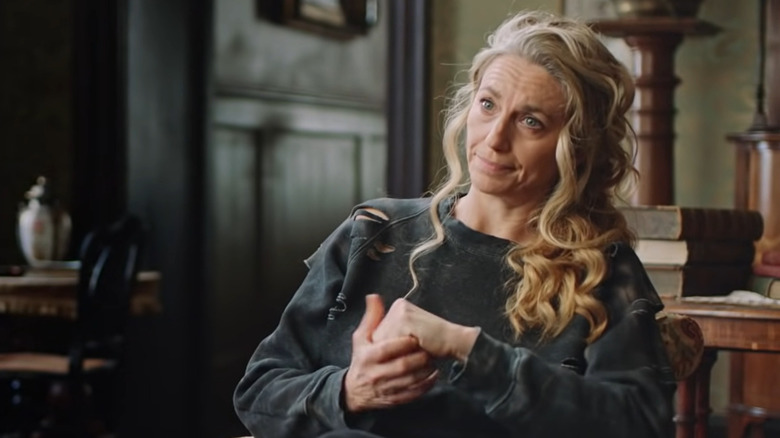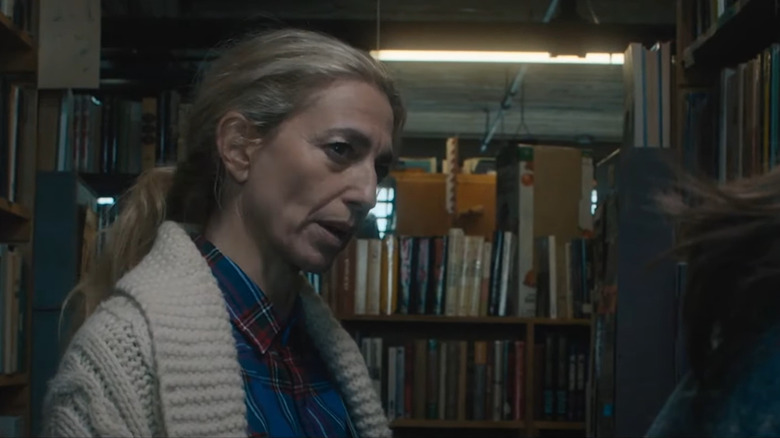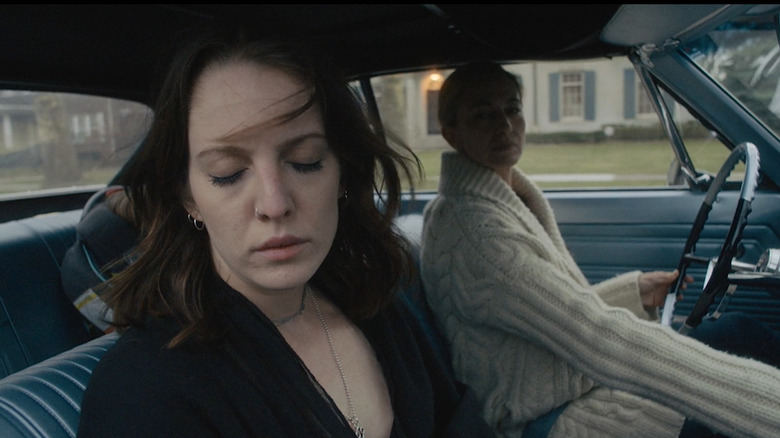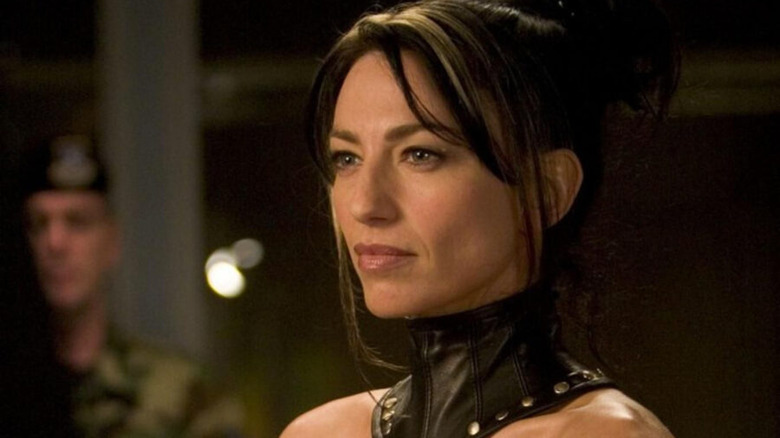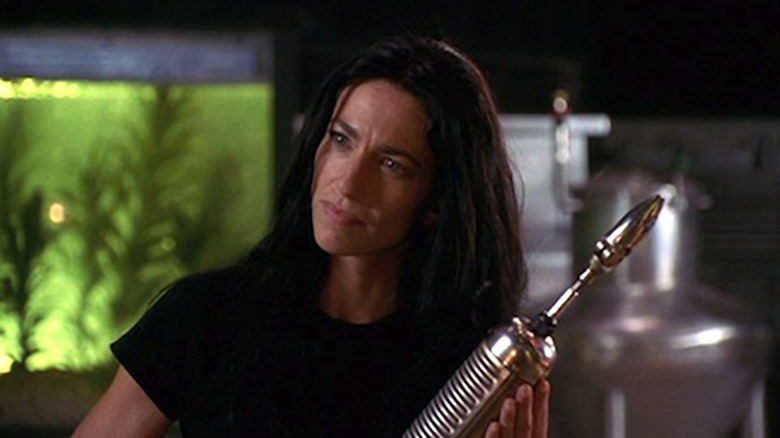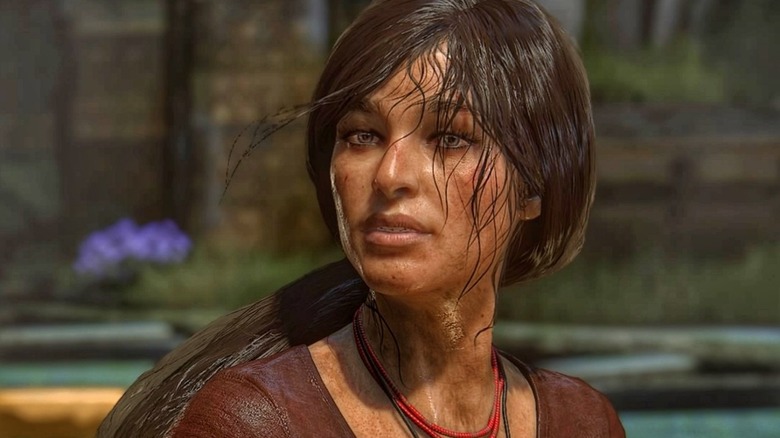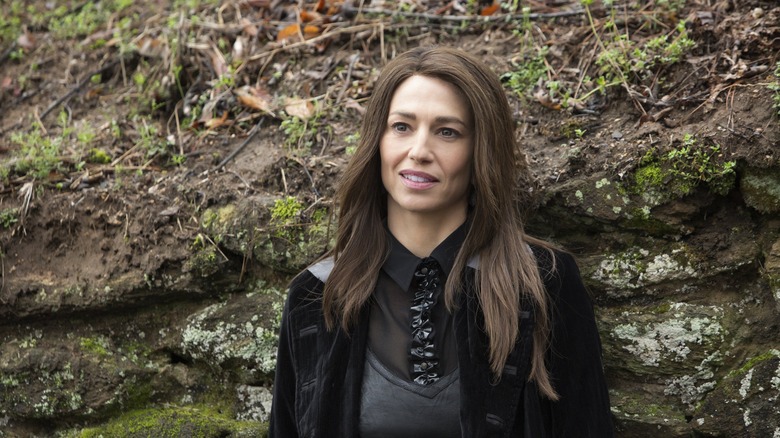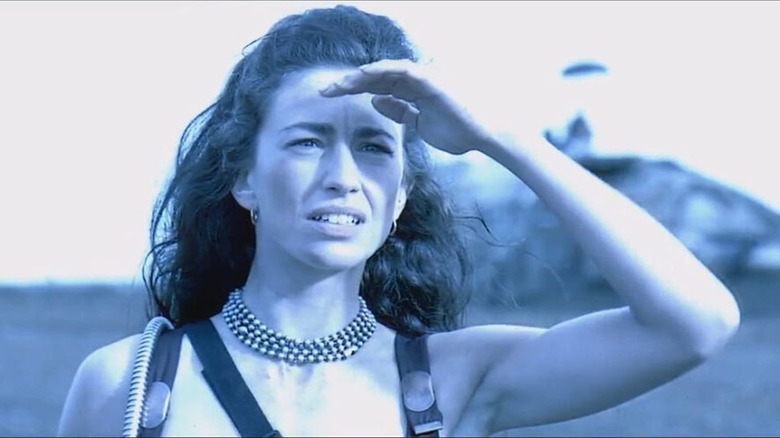Claudia Black Gets Deep About Trauma, Video Games, And The Future Of Film [Interview]
Occasionally, Twitter can be a magical place. Usually it's a cesspool of bad takes and angry trolls, but every once in awhile it allows stories to be shared that wouldn't get to shine otherwise. When actress Claudia Black was sent an article by /Film's Hoai-Tran Bui where James McAvoy shared a story from the premiere of "Son of Dune," she recognized herself in the story. She also had a very different perspective to share, in a viral tweet thread that she called "The Comeback Curry."
A peek behind the curtain: I've been a big fan of Black's since before I was even a budding entertainment writer. She's portrayed some of my favorite characters in fiction, from Pandora in "Queen of the Damned" to Morrigan in the "Dragon Age" games. So when I was offered to chance to chat with her about her new movie, "Time Now," the Comeback Curry, and more, I jumped for joy. Come interview time, I was nervous like I hadn't been since I was a little baby reporter. But that was silly, because Black is basically an interviewer's dream: she's smart, funny, and deeply genuine.
Hailing from Sydney, Australia, Black got her start in guest roles on shows like "Hercules: The Legendary Journeys" and "Xena: Warrior Princess" before starring in the Vin Diesel sci-fi horror film "Pitch Black" in 2000. She became part of the sci-fi TV pantheon with the role of Aeryn Sun on "Farscape," but would also go on to star on "Stargate: SG1." She's the voice of dozens of incredible video game characters, including multiple characters in the "Mass Effect" series, Chloe Frazer in the "Uncharted" games, and even the Mistress of Pain in "Diablo III." She's even voiced a Gazorpazorp on "Rick & Morty." Black is true sci-fi royalty in every way.
Black called in via Zoom from London to speak about her latest film, "Time Now," which is now in theaters and available to rent on VOD. "Time Now" follows Jenny (Eleanor Lambert), a young woman who returns home to Detroit after the suicide of her brother. Black plays Jenny's Aunt Joan, a free-spirited woman who encourages Jenny to embrace her family and let herself heal. We talked about the focus on trauma in "Time Now," the "Comeback Curry," "Uncharted," smashing the patriarchy, witches, vampires, and much more.
This interview has been lightly edited for clarity.
"I would be so inspired by my kids' kindie teachers..."
"Time Now" is such a challenging movie. It's a really, really hard story. And every time you're on the screen, it's this moment of warmth. And I was wondering what you brought to that role, because it seems like you really had a lot of fun interacting with your child co-star and you just have this great mom energy. So I wanted to know where that comes from.
Well, I think you either have to have a playful spirit and have easy access to your own inner child. It certainly helps to have your own children, if you've got a good relationship with them. I remember Glennon Doyle saying that she's not the fun mom, and I can actually really relate to that. As a single mother, it's just, I'm more chores than I am human these days. So I'm certainly having to get stuff done.
So this was a wonderful retreat for me and an opportunity to play with a gorgeous kid, and he was so lovely and charming and the parents were sweet and very trusting. And I would be so inspired by my kids' kindie teachers, kindergarten teachers and preschool teachers, and just how engaging and present they were and how they seemed to really enjoy themselves and love being around children. And I think if you're going to work with kids that needs to be a prerequisite, but it's not always the case in film. But yeah, we just had a blast. He was just ready to play and was so receptive, and Eleanor and I just fell into an instant soul friend connection.
And I felt that I really believed in [director Spencer King] and still do. This was an interesting project because my manager knew the producer and he said, "Look, there's just something about this filmmaker, Spencer. He's got something." And I read the script and I said, "I agree." And so I think we were all just making this for the right reasons. We wanted to experiment and not be precious and see what we could make with the very few resources that were available.
So I think that also creates an environment of freedom and play, even though we didn't have a lot of time. It's not like we were mucking around on set, but there was this sort of comfort in knowing that no one was being precious. So it was a great sandpit. And I knew I could just sort of be helpful in that regard and sort of help create enough sort of distraction and play so that we could get what we needed from our more junior performers.
"Can we take our broken heart and turn it into art?"
And "Time Now" is so heavily about trauma and survivor's guilt and grief. Were you drawn towards that more difficult subject matter? I know you're a trauma coach. So is that something that you really just wanted to dig into?
Well, I mean, not really, but it's nice to be speaking from the scar rather than the open wound. And I think that's important for writing in general and I think it's important for artists. There's less self-harm when we can talk from the scar. And I think that for me, trauma and creativity go hand in hand, and I'm curious about the places where we can shift the paradigm from this very patriarchal concept that we have to suffer in order to be artists to, can we as Carrie Fisher, the great Carrie Fisher, said, "Can we take our broken heart and turn it into art?" And we see some of the characters trying to do just that. And so I'm interested in that space. How do we transform things?
When I think about what I'm... It's so odd. One day I had this realization, the things that I like are things that are basically all to do with transformation. So for me, trauma coaching, it's more trauma and creativity because I like... It's still a patriarchal concept, this idea of the wounded healer, but I like the idea of what we can make out of something that was harmful, what can come from it. And it has to come from the individuals. If the culture or someone tries to force meaning or impose meaning upon someone who's suffered, it doesn't work. And I think we see that with our central character. If she doesn't find her own way, then no one could do that for her. And I think we see the consequences of our past catching up with us in ways where we're under resourced and think we have limited options and don't know what to do with our pain. Then our row gets more and more narrow and much more lonely.
So Spencer and I talked about that from, per your previous question, Aunt Joan always seemed to be sort of the heart in a way. She was the one that was still trying and still wanting to connect, and still hoping for more. There's this one moment in the film where she's so understated, and they're about to get out of the car. And Jenny says she wants to go and stay at his apartment. And Aunt Joan just says, "He was a cool kid." And I just feel like there was just so much in that moment of potential unrealized.
And that's something that I think has sort of set me on this path with the trauma and creativity work is I'm obsessed with this idea of human potential and what inhibits it and how to support people to get where they deserve to be going. I just feel like everyone deserves to go where they want to go, as long as it doesn't harm anyone else. And I lose sleep at night, proverbially, I'll say, I've got much better sleep now, but it really distresses me and upsets me and hurts. I get heartsick feeling that people, that they're suffering and they're not creating and expressing. And so Aunt Joan has the... Art Joan, that's funny. We had this whole backstory for her and I think she was a very creative soul and really wanted to have a second go herself, have a bit of a renaissance. And she's sort of hanging in there and hoping that the same thing will happen for Jenny. And she just goes down a different road.
Spilling the Tea on the Comeback Curry
So speaking of a comeback, speaking of trying to help the future be better. I have to talk about the Comeback Curry Twitter thread.
Life is weird.
It's so weird. Did you think your story would blow up the way it did?
No. I mean, I have to say that there was a part of me that knew because of the way the culture is and the way social media seems to work, because I'm a bit of a Luddite. I knew that mention... Look, I don't know James McAvoy well. Obviously, misspelled his name about 5000 times, which was just brilliant, but he just seems to be a good egg. And so I love stories about good people and I sort of ended up being central in it, which was weird. So it's a good thing I'm not a journalist because in that sense, I should not have been part of the story.
I mean, there's just so much I could say, but it's very meta, isn't it. And now people are writing articles about the thread, about the article and it was so beautiful talking to the author of the original article. And they said, "It's not often they get that their words can sort of precipitate joy," and it just sort of midwifed this really lovely sort of vulnerable experience for me, as I said to them. And I think there was a part of me that knew that because James McAvoy seems to be so beloved that it would get some kind of traction. And I kind despise that at the same time, because I thought, "Well, can't a story like this stand on its own merits?" But I guess by virtue of the people involved, it has some kind of more intrinsic value perhaps because it is about an actor who has done so well and is so beloved. And I guess me, it's similarly, but in a more sort of cult arena.
But there's a lot in there about what happens to women versus men. Very interesting. There were some show runners that chimed in and retweeted and said, "Oh God, I know I'd love to work with you. And I know people who'd kill to work with you." And it's like, well, that's interesting because my phone number's about 10 digits or something. We get told that once you hit your forties, as a woman in the business, you'll go into a lull. My manager said as much and very specifically, because he'd witnessed it with very successful actors on his books. So there seems to be this black hole where... And maybe it coincides with women having to put more focus on their children because of the way the culture seems to be so one sided still in that regard.
But I was the primary breadwinner for years. I was working through my pregnancies. I worked right after them. And partially because of that, went into a life crash because I was so exhausted and it's unsustainable, and what's expected of you is unsustainable. And at certain points I even said to people I was working with, producers on the show, "I'm feeling it," when I was pregnant. I said, "Something's wrong." And I almost miscarried my second kid, and that was not handled well. And so there's just all these things that women have to navigate that aren't talked about. So I'm really hoping that the conversation where it has resonated seems to be in those really important places where these things need to be discussed. I feel like saying, "Great, well, let's have a cup of coffee," to that show runner. "And let's talk about ways that we can create a culture that supports other."
"A Turducken of Trauma"
And so how do you feel about all of these movements that have cropped up just in the past few years, from Time's Up to the Netflix walk out, to the IATSE strike. Do you think we're making real progress? Do you think people feel like they finally have a voice?
I think we absolutely are. I'm currently reading with a friend, I'm doing another little book club with her, and we're reading Tarana Burke's book "Unbound." And it's really humbling to hear even her prologue about how she had been so humble and quietly doing this work in the best way she knew how, from her lived experience and expertise, that it needed to be taken more seriously than a hashtag. She didn't want it to be something that could be glossed over. And she was so gracious in the way that she then reentered the fray once she realized that the phrase had been co-opted. And I look forward to learning more as we explore the book. It's just time. I think there was enough attention. I think that the internet is a tool and a weapon. And with regard to these movements, it is being used as a tool. And with regard to the elections we've had, it's been weaponized to very dangerous effects.
I think that, having been a survivor of Me Too situations, one experience alone of severe sexual harassment is enough to derail someone's life forever. I remember my mum was visiting from Australia when the Weinstein story broke. And as it hit the news, my hands started to shake, and I think every person, male and female, and non-binary, read those stories and started to have a somatic response, because so many of us have experienced it. And it goes to the core of who we are and how we work and how we relate and how we connect and the power structures. And I think we really are in the death rattle of patriarchy, and we'll see, but it's not going to go out without a huge damn fight. And so we all need each other.
And I think it's really important to acknowledge that patriarchy hasn't been great for men either. It's a pyramid scheme, and it only does well for those who are willing to squash the others below, and that's unsustainable. So just as we've found that it's utterly exhausting to try and ostensibly thrive and succeed within this model, I think men are really exhausted too. And we need better fathering imprints and better mothering imprints. And it's happening. I'm seeing it everywhere, especially in the trauma circles where we're finally able to have discussions about bonafide cures, where even two decades ago, trauma was still such a dirty word because no one wants to claim an illness that can't be cured because that's a death sentence, and a really protracted and painful death sentence because it's slow and isolated, and trauma itself is so fragmenting and isolating.
So I think, and I've said this before online, I mean, America certainly is in a turducken of trauma. We've got climate crisis and we've got this insanely evil history of systemic racism, and this rise in extreme right wing politics and fascism. And we're sort of sink or swim. So I think these movements, it is time. And I think because of the internet, we're actually finally finding strength in numbers.
Fingers crossed.
I know.
"We really have to look at the stories we're telling now"
You've done a ton of voice acting. Who are some of your favorite characters to voice, and is there any established character out there you'd like to take a swing at?
I mean, firstly, I mean, Chloe Frazer probably is my absolute favorite, from the Naughty Dog franchise "Uncharted." Doing "Lost Legacy" and getting to play with Laura Bailey. And really it was Amy Hennig, who's no longer with Naughty Dog. When you get to work with a female writer, she was the one who really established these characters of Elena and Chloe. And it was with such thoughtfulness and they were layered and interesting. And Nolan, such a treat to work with, and they prioritized performance. And I remember when they first came out with their first one or two Uncharted games, people just couldn't understand how they'd achieved the results they had. And part of it's very unhealthy grind and not okay. And part of it is wonderful prioritization of, as far as we're concerned as artists, the right elements.
Motion capture, when it's done well, combines all of the elements for an actor, I think, that are joyous because it feels like film and it feels like theater, and it's still voice work, but you're out of the vacuum of being in a booth by yourself. So it's highly interactive and it's hugely improvisational. And so it's just an absolute dream. And the technology is so extraordinary now. Like I remember originally seeing when we were standing in the volume, there'd be a screen that was picking up stick figures of where our markers were on our suits. And now you get a half rendered version of yourself. It's just wild how much it's changed in the last even sort of 13 years or so. So I would say that's a real treat.
I do think we really have to look at the stories we're telling now, because these shoot them up games are problematic. Not because I think they create a culture of... I don't think they inspire gun violence. I think what they do do though, is create a real dissonance for the player now because we like these people, but then they go on these shooting rampages and that I think needs to be reconciled. It's a legitimate phenomenon that needs to be addressed. Puzzles. Why not puzzles? I love Jane McGonigal's work, thinking about how we can harness those epic win energetics for social change. So I'm interested in... I'd love to work on games that support the expansion of the consciousness. I think that's really where most of my work is pointed and focused.
"I get to play out shadow aspects of being human."
And you've also played a lot of really cool spooky archetypes, from a powerful witch on "The Originals" to my very favorite vampire in all of the Anne Rice books, Pandora in "Queen of the Damned." And it's Halloween season, so I want to ask if you were offered the ability to be a vampire or a werewolf or a witch or whatever, would you take it and which one?
Oh, a witch, for sure. For sure. I just think it's so strong in me, the archetype of the witch, because it's a transformational paradigm and archetype. And I think that even though I've played a lot of negative iterations, ostensibly negative iterations of witch, I think our inner witch is the most powerful and juicy archetype that we have. And I'm really saddened by the historical documenting that's now becoming more publicly understood of the feminine being bifurcated and being so threatening. And that witches used to gather on Friday the 13th and pray for the world and pray for the planet. And what witches did was beautiful and generative. And I think it's a part of us. I'm actually into my moon rituals. I do follow the moon cycle, and I do attune to the earth. And I am attuned to animals, I have a lot of wild animals on my property. And I'm very connected to the earth and my land, and very grateful for it and humble, and humbled by it. And I think that's real witchcraft. So I think it's not a big extension from who I naturally am.
Just with the sort of emerging neuroscience and watching the science space try to catch up with the sort of the spirit and energetic space, it's really kind of funny. My mom's a scientist, and there are things that I know and understand from intuition that she'll sort of years later after sort of turning her nose up at it and sort of deriding it will say, "Oh my God, you were right all along." And I'll be like, "Yeah, this is exhausting. Come and join my party because more fun." I have a huge reverence for science. I just think that it's time for science and sort of magic and the arts to re-meet in the same circle. And I think that to an extent that's sort of what we are doing, maybe what I'm doing with my storytelling and the roles that find me.
And I think it's a really important question to ask, "Why has this role found me? Why has it chosen me?" It's a miracle anytime we get cast in anything. Actors worldwide will say, "It's a terrible, really rough business," where you're kind of in an abusive relationship, where you love the thing so much, that you are willing to stick with it. And you wait by the phone that may never ring, and then you're going to get dumped for a younger blonde. When we do get these roles, at least 12 people have had to say yes to you playing them, which I don't undervalue and try to really remind myself of. So I think, "Well then, why am I playing this witch? Why has the soul of this character chosen me in this moment and how can I do them justice?"
And it's also really important spiritually, I would say, to have these opportunities to reflect shadow aspects of humanity back to ourselves. So there's enormous efficacy for me and value, while I don't want it to be therapy for me, I get to play out shadow aspects of being human so that I don't have to in my life. And it allows me to have a very integrated shadow and to know what I could be, and have just chosen not to be in this lifetime and get to play with in a really safe way.
"You'd probably choose vampire."
That's so cool. And is there anything else you want the /Film readers to know, since Hoai-Tran originated the story? Is there anything you want folks to know over there?
Well, I just want to ask you first the same question. What about you, witch, werewolf, vampire? You'd probably choose vampire. [Note: I was wearing dark purple lipstick, so, fair.]
Probably witch. Probably witch, just because, like you said, I love the idea of the nature healer and the moon and the earth and just all of it. It's such an interesting history.
Yeah. And real and quite recent, so it's not... When I think about the lineage even of shamanism, it was sort of most likely, I think they've traced it back to Siberia. So these midwives in a village saw people in and they saw people out, and they attended to all of the maladies in between. And I think we all have that in us. So this idea that that can all be reawakened. I think that's the energy that we need right now to turn this page on this precipice in human history.
Is there anything else that I would want to say? I don't think so. I feel like we've covered it. I'm just always humbled and grateful and amazed, and really touched when people share their own stories. When I share mine and people share how certain stories have moved them, I didn't expect... I mean, I've always known this, that the more specific and vulnerable we are, the more universal it becomes, but I'm just really looking forward to engaging with more people online and hearing their stories, and figuring out what stories need to be told right now, because I'm moving into that space now where I'm wanting to tell more stories and be more involved from the ground up. So I'm just curious to know what people are interested in and what's touching them, and moving them, and where we can go from here?
